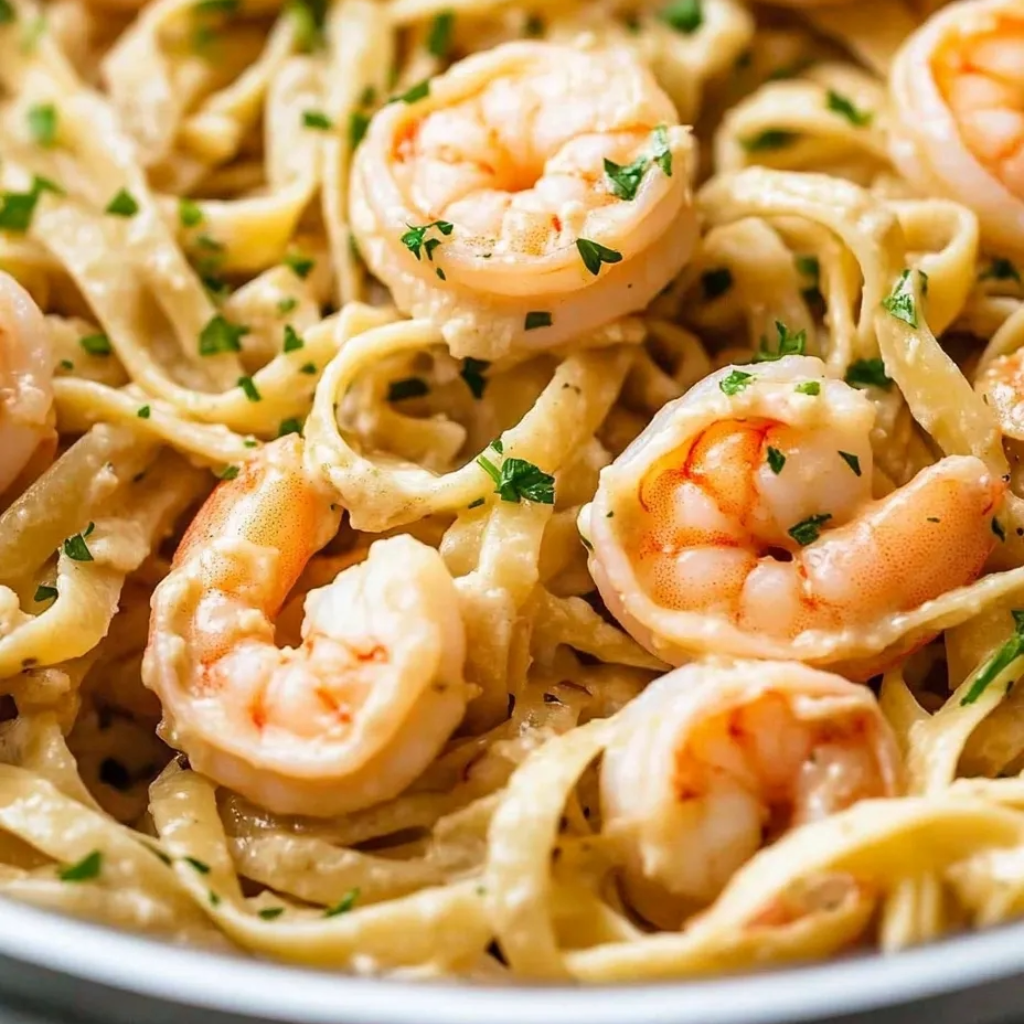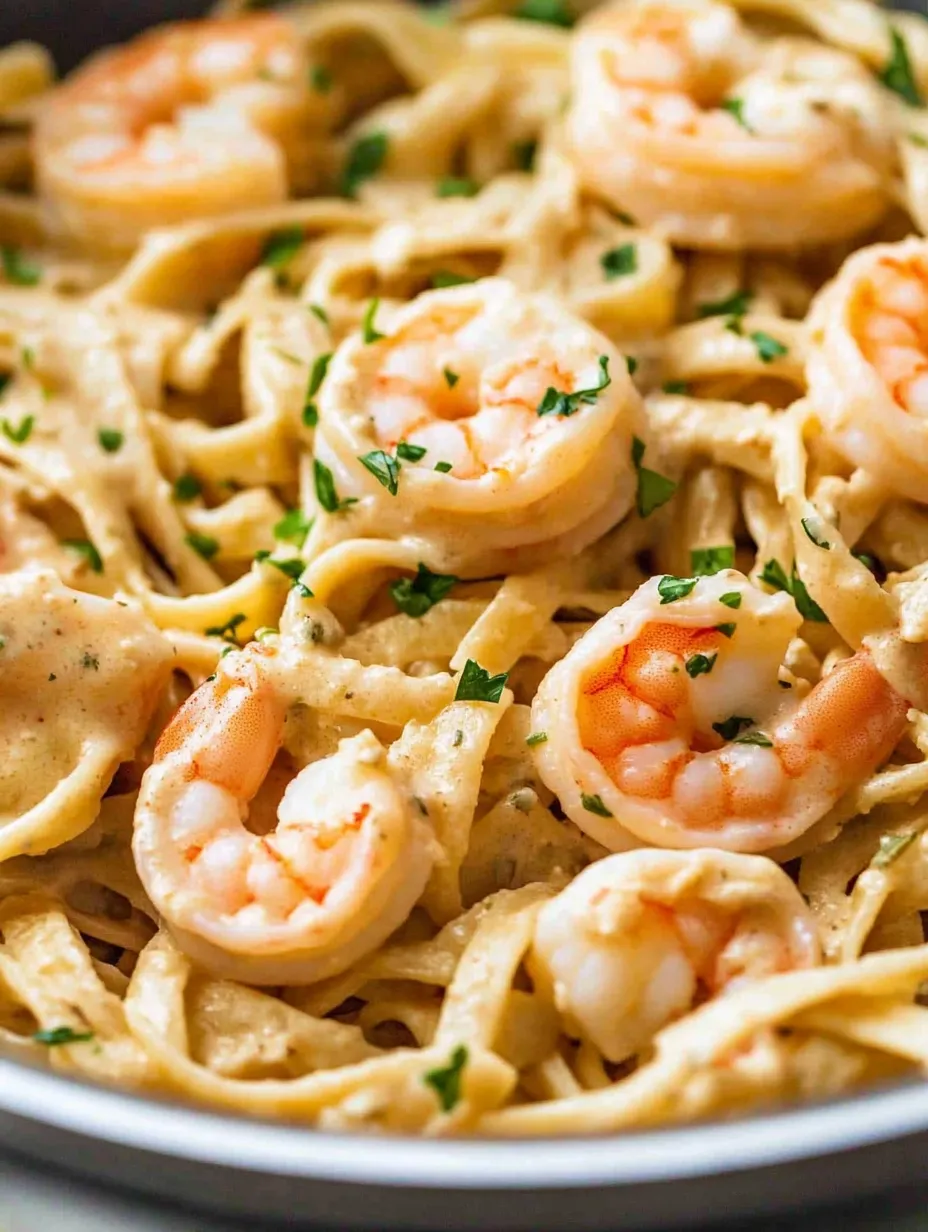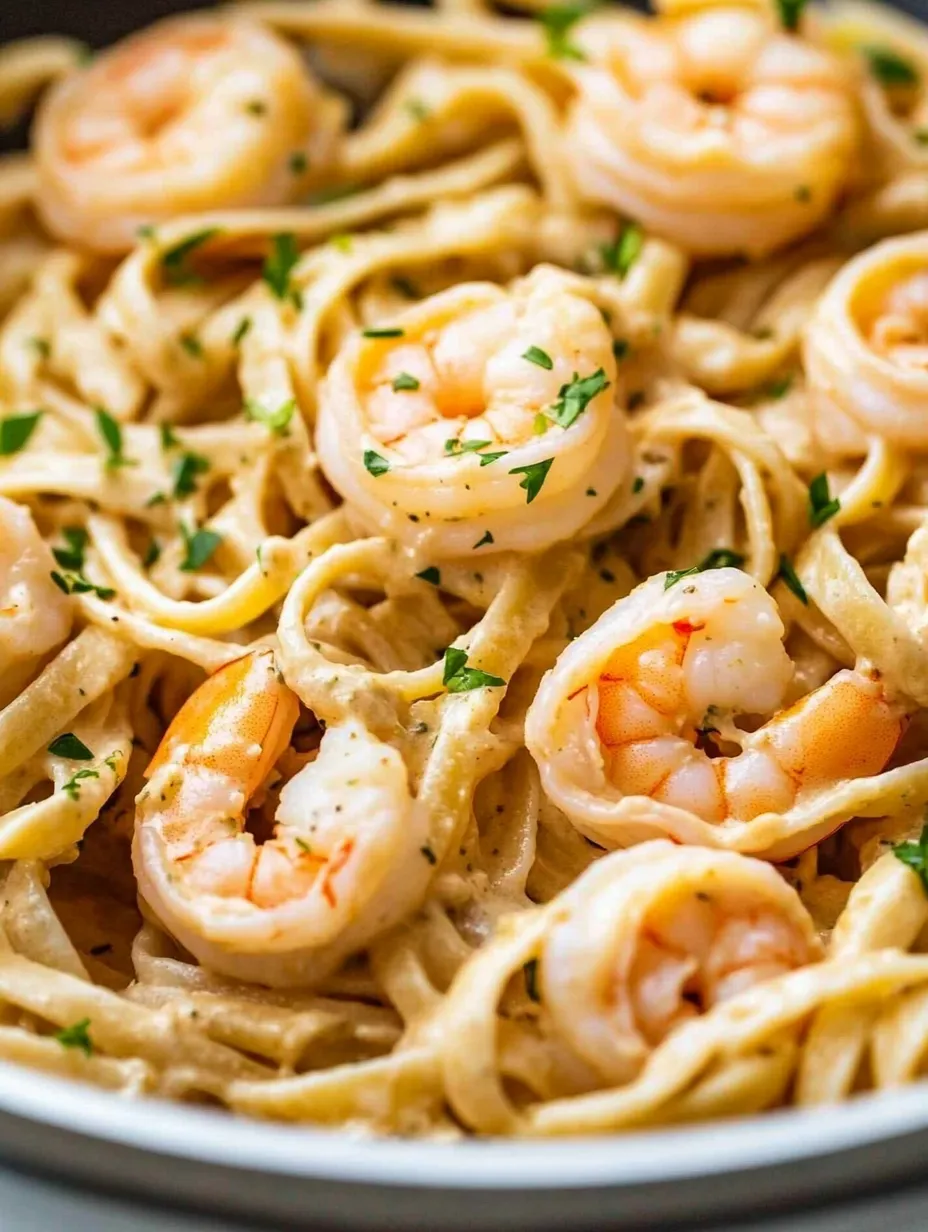 Pin it
Pin it
This silky pasta dish combines tender shrimp with a rich, garlicky cream sauce that clings to every strand of pasta. It's a restaurant-worthy meal that comes together in just 15 minutes using simple ingredients you probably already have on hand. The magic happens when the garlic-infused butter meets sweet shrimp and velvety cream, creating a sauce that's luxurious without being heavy. Perfect for date nights or family dinners, this pasta manages to feel special while remaining incredibly simple to prepare.
I discovered this recipe purely by accident one evening when I needed to use up some leftover cream. I was making my usual garlic butter pasta and decided to toss in some shrimp and a splash of the cream that was about to expire. My husband took one bite and went completely quiet – that special kind of quiet that means someone is too busy enjoying their food to speak. Now he requests this pasta at least twice a month, and I happily oblige because it's so effortless to make.
Perfect Ingredients for Garlic Butter Shrimp Pasta
- Raw shrimp: Look for peeled and deveined to save prep time; medium-sized (31-40 count) work beautifully, thawed and patted dry
- Linguine pasta: Its flat, ribbon-like shape holds the creamy sauce perfectly; fettuccine or spaghetti work well too
- Butter: Use unsalted so you can control the seasoning; quality butter makes a difference here
- Fresh garlic: Mince it yourself for the brightest flavor; pre-minced jarred garlic doesn't deliver the same punch
- Heavy cream: Creates that silky sauce with body; the higher fat content emulsifies beautifully with the pasta water
- Parmesan cheese: Buy a block and grate it yourself; pre-grated contains anti-caking agents that prevent proper melting
- Old Bay seasoning: The secret flavor booster that complements seafood perfectly; cajun or smoked paprika work in a pinch
- Olive oil: Use a good quality one since you'll taste it in the final dish; it prevents the butter from burning
 Pin it
Pin it
I've found that the key to making this dish truly special is good quality shrimp. Wild-caught gives the best flavor, but sustainably farmed works beautifully too. Just make sure your shrimp are completely thawed and patted dry before cooking – this ensures they get a nice sear instead of steaming in their own liquid.
Step-by-Step Cooking Instructions
- Step 1:
- Cook pasta with precision – Bring a large pot of water to a rolling boil, then add a generous tablespoon of salt. Add 8 ounces of linguine and cook according to package directions until just al dente (usually 1 minute less than recommended time). Before draining, scoop out 1 cup of the starchy pasta cooking water and set aside – this magic liquid is essential for creating a silky sauce. Drain pasta but don't rinse it; the starch on the surface helps the sauce adhere.
- Step 2:
- Prepare shrimp with care – While pasta cooks, pat 1 pound of peeled, deveined shrimp completely dry with paper towels. This ensures they'll sear properly rather than steam. Season lightly with a pinch of salt and freshly ground black pepper.
- Step 3:
- Cook shrimp to perfect tenderness – In a large skillet over medium heat, melt 2 tablespoons of butter with 1 tablespoon of olive oil. When the butter stops foaming, add the shrimp in a single layer, being careful not to crowd the pan (work in batches if necessary). Sprinkle with 1/2 teaspoon Old Bay seasoning or paprika. Cook for 1-2 minutes per side until they just turn pink and start to curl. They should still have a slight translucence in the center as they'll continue cooking later. Remove to a plate and cover loosely with foil.
- Step 4:
- Create the aromatic base – In the same skillet, melt another tablespoon of butter. Add 4 cloves of minced garlic and cook for just 30 seconds until fragrant, stirring constantly to prevent burning. The residual heat from the pan should be enough – if the garlic starts to brown, lower the heat immediately.
- Step 5:
- Build the velvety sauce – Pour in 1 cup of heavy cream, using a wooden spoon to scrape up all the flavorful browned bits from the bottom of the pan. This deglazing step incorporates all that wonderful shrimp and garlic flavor into your sauce. Bring to a gentle simmer and cook for 2 minutes.
- Step 6:
- Enrich with cheese – Add 1/2 cup freshly grated Parmesan cheese and stir until melted and smooth. If the sauce seems too thick, add 2-3 tablespoons of the reserved pasta water to reach your desired consistency. The starch in the water helps the sauce cling to the pasta rather than sliding off.
- Step 7:
- Combine everything with finesse – Add the cooked linguine directly to the sauce, tossing gently with tongs to coat every strand. Add the shrimp back to the pan and toss once more, just until the shrimp are warmed through. If the sauce becomes too thick, add a splash more pasta water to loosen it.
- Step 8:
- Finish with fresh touches – Remove from heat and sprinkle with 2 tablespoons of fresh chopped parsley and an extra grind of black pepper. Serve immediately in warmed bowls to keep the sauce at the perfect consistency.
The Secret to Perfect Shrimp Pasta
The reason this pasta tastes so incredible comes down to a few simple but crucial techniques. First, cooking the shrimp in butter and then using that same pan for the sauce means you capture all the sweet, briny flavor the shrimp release. Second, the reserved pasta water contains starch that helps emulsify the sauce, giving it that restaurant-quality silkiness that clings to each strand of pasta.
I've made this dish countless times over the years, and I've found that letting the pasta finish cooking in the sauce for the last minute or two makes a tremendous difference. The pasta actually absorbs some of the flavor rather than just being coated with it. It's a small thing that makes a big impact on the final result.
A Versatile Recipe for Every Occasion
What I love most about this pasta is how it transitions effortlessly from casual family dinner to romantic date night. For a family meal, I might serve it with a simple green salad and some garlic bread. For date night, I add a glass of chilled Pinot Grigio and maybe some chocolate mousse for dessert.
My teenage daughter, who went through a phase of refusing all seafood, was won over by this pasta. 'It doesn't taste fishy at all,' she declared after reluctantly trying a bite. Now she requests it regularly, proving that sometimes the simplest recipes have the broadest appeal.
My husband, who typically reaches for the salt shaker before even tasting his food, never adds extra seasoning to this pasta. The combination of naturally sweet shrimp, salty Parmesan, and the subtle kick from Old Bay creates such a perfect balance that it truly needs nothing else.
 Pin it
Pin it
I'll never forget making this pasta for my in-laws the first time they visited after we were married. My mother-in-law, who rarely offers cooking compliments, asked for the recipe before dessert was even served. There's something deeply satisfying about creating a dish that seems far more complex than it actually is. That's the beauty of this creamy garlic butter shrimp pasta – maximum flavor with minimal effort, which is exactly what makes it a recipe I'll treasure forever.
Frequently Asked Questions
- → Can I use a different type of pasta?
- Absolutely! While linguine works wonderfully with this creamy sauce, you can substitute fettuccine, spaghetti, penne, or any pasta you prefer. Shorter pastas like bowties (farfalle) or rotini will also hold the sauce nicely.
- → What can I use instead of heavy cream for a lighter version?
- For a lighter option, you could use half-and-half or whole milk, though the sauce won't be as thick. If using milk, you may want to create a roux first (using 1 tablespoon each of butter and flour) before adding the milk to help thicken the sauce.
- → Can I add vegetables to this dish?
- Yes! Spinach, cherry tomatoes, peas, or asparagus would be delicious additions. For spinach or tomatoes, simply add them to the sauce during the last minute of cooking. For firmer vegetables like asparagus, blanch them first or sauté them before making the sauce.
- → What can I substitute for Old Bay seasoning?
- If you don't have Old Bay, you can use cajun seasoning, smoked paprika, or make your own blend using paprika, black pepper, cayenne pepper, and a pinch of celery salt. You can also simply use Italian seasoning for a different but still delicious flavor profile.
- → Why is my sauce separating or looking curdled?
- This usually happens when the heat is too high when adding the cream. Always reduce heat to medium-low before adding cream, and don't let it boil rapidly. If your sauce does separate, sometimes a splash more cream and gentle whisking can help bring it back together.
